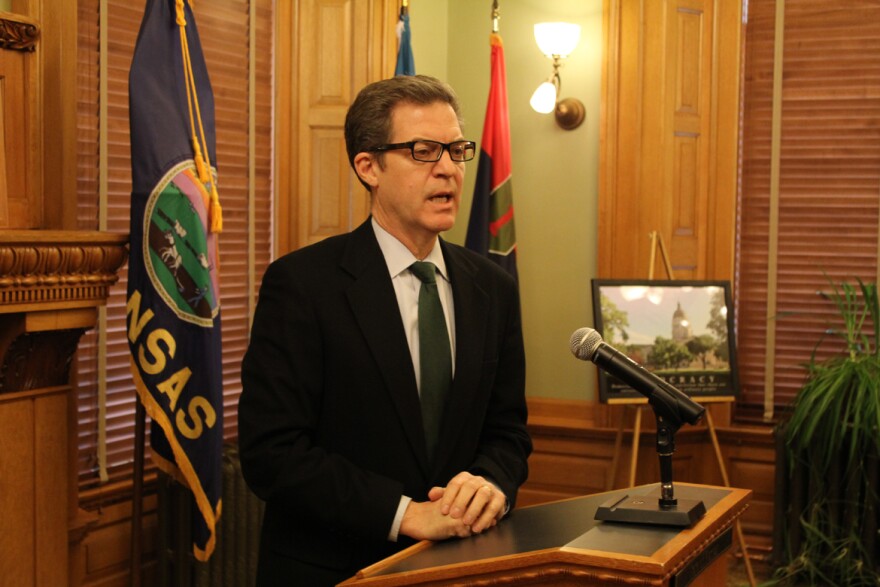Kansas Governor Sam Brownback made his case Thursday for why Kansas food stamp reforms should be a national welfare-to-work model, even though the study he used to support his claim showed almost 80 percent of Kansans affected remained in poverty.
The governor touted his administration’s policies — including reinstating a work requirement for food stamp recipients — as an alternative to what he described as a series of failed welfare policies dating back to President Lyndon B. Johnson’s “war on poverty” in the mid-1960s.
Data from the Kansas Department for Children and Families and the Kansas Department of Labor, which the right-leaning Foundation for Government Accountability analyzed for a report, showed incomes rose 127 percent, on average, for the roughly 41,000 Kansans who no longer receive food stamps, Brownback said.
“This is success,” he said. “The objective here is to get people out of poverty.”
As of the fourth quarter of 2014, about 79 percent of Kansans who had lost food stamps remained in poverty, however, and 71 percent were in “severe poverty,” meaning they earned less than half of the poverty line — or $5,885 a year for a single adult. The report didn’t track poverty data in 2015.
Incomes among those Kansans did rise 127 percent by the end of 2014, on average, increasing from $2,453 per year to $5,562 per year. That is less than half of the federal poverty line of $11,770 for a single adult.
The report tracked adults, without disabilities or dependents, who no longer received food stamps after Kansas reinstated a requirement that they work at least 20 hours per week or participate in certain job training programs.
Generally, the people tracked for the study left the food stamp program for one of three reasons:
- They obtained a job and earned too much to remain eligible.
- They were disqualified because they failed to get a job.
- They consistently worked less than 20 hours a week.
Those who found jobs did better, with average incomes of $13,304. Still, 51 percent of those who landed jobs remained below the poverty line and 30 percent remained in “severe poverty.”
Shannon Cotsoradis, president and CEO of Kansas Action for Children, said she is concerned that more Kansans are being disqualified from food stamps because they aren’t working enough hours than because they are earning too much.
“A true measure of success would be the number of Kansans leaving public assistance programs because they earn too much to qualify. Instead, the data presented today shows that Kansas adults are losing food assistance because they aren’t able to find enough work and earn too little,” Cotsoradis said in a written statement. “These policy changes do not promote self-sufficiency — they only force some of the state’s poorest Kansans to go hungry.”
The report showed 59 percent of the 12,859 Kansans in the first group removed from food stamps found jobs within one year — meaning about 5,272 still were unemployed a year after their last food stamp payment.
Some former recipients reported earning $40,000 or more per year, but a larger percentage found work in traditionally low-wage industries. About 19 percent had jobs in food service, 16 percent were working in retail and 7 percent worked in nursing and residential care facilities.
Brownback said reinstating the work requirement has succeeded because it has moved more people out of poverty than the “big government” policies that it replaced. It wasn’t clear what data he used for comparison.
He said that although he won’t be satisfied until all Kansans are living above the poverty line, “this is something that has worked and is working.”
Brownback suggested U.S. House Speaker Paul Ryan might consider the Kansas program as a model for federal reforms. Lt. Gov. Jeff Colyer also recently visited Ohio to tout Kansas’ changes to public assistance.
“People who used to be dependent on government are finding more than just a way out of poverty,” Brownback said. “They find dignity and self-worth.”
Megan Hart is a reporter for KHI News Service in Topeka, a partner in the Heartland Health Monitor team. You can reach her on Twitter @meganhartMC

